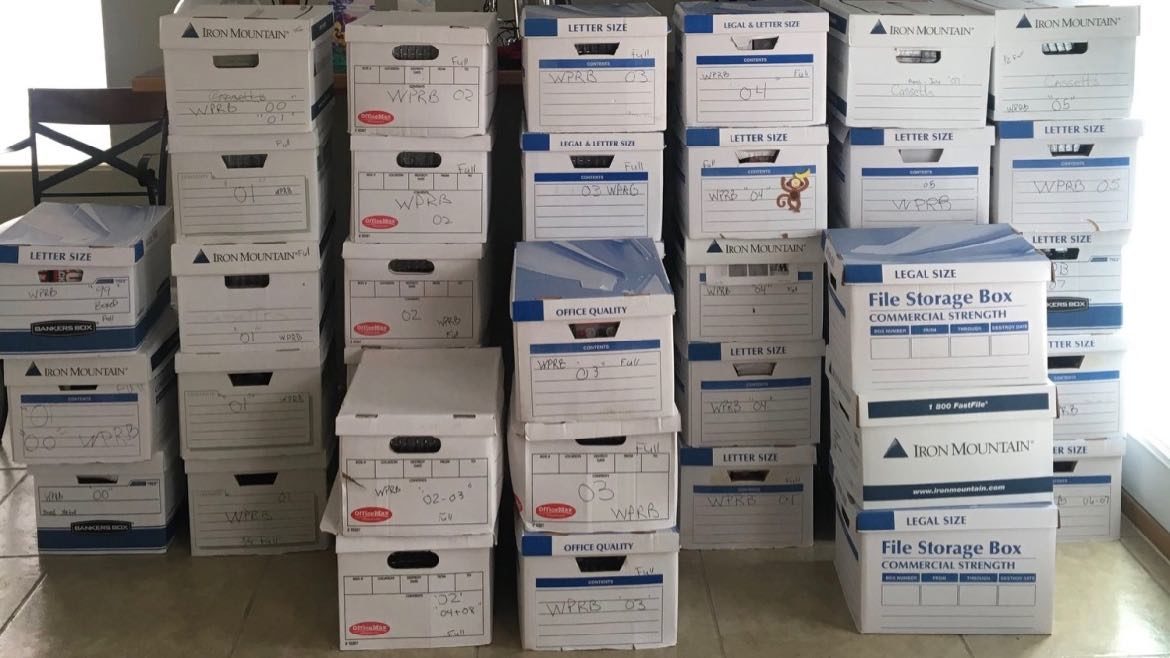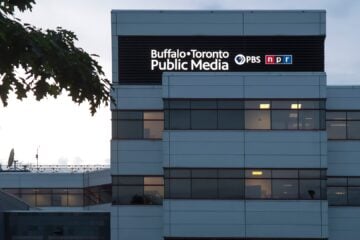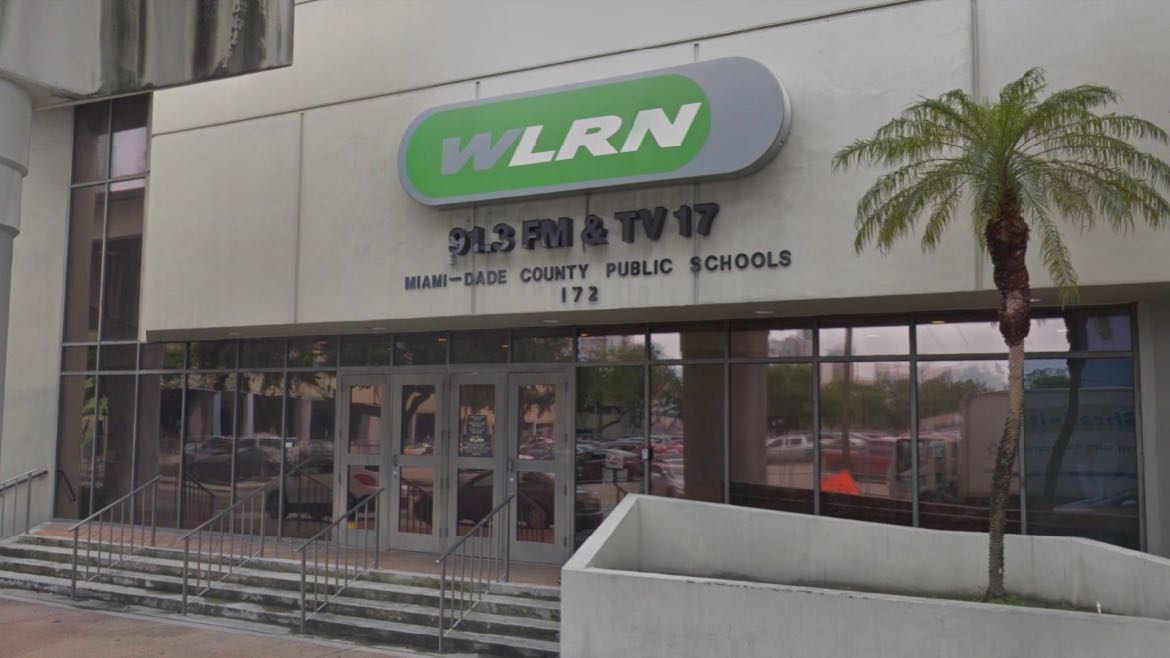Fan’s collection of 8,000 cassettes preserves unique era in Princeton station’s history


As the educational advisor to WPRB-FM in Princeton, N.J., Mike Lupica was already digging into the freeform music station’s 75-year history. Then a gift came out of the blue: A woman wanted to donate her late husband’s collection of home recordings of WPRB broadcasts.
Arriving at her home, Lupica was confronted with 41 file boxes containing 8,000 cassettes.
“This was way out of the league of what I’m accustomed to dealing with,” he told Current.
But he was happy to receive it. “Imagine if someone offered you a photo album that was filled with pictures of you and your family from the last 20 years, and you had never seen any of the pictures before,” Lupica said. “Obviously, you’d be interested in that.”
The late WPRB listener, whom Lupica declined to name in deference to the widow’s request, made the recordings from 1998–2005, meticulously annotating them with dates, names of DJs and notes about special programs. For WPRB, which doesn’t archive its programming, the boxes of Maxell and Memorex tapes preserve a swath of station history that would otherwise have been lost.
WPRB is housed on Princeton University’s campus but is independent from the university. Its hosts are Princeton students and community volunteers. The title of one show, Music You Can’t Hear on the Radio, exemplifies the station’s dedication to airing obscure and unusual music.
Dan Ruccia, who worked at WPRB from 2002–05 and remains active on its alumni board, was shocked when he learned of the 8,000 cassettes Lupica had come across. He recalled that when he saw the boxes, he said “Oh my god, that probably contains every show I ever did.”
The tapes capture an era when WPRB’s hosts “were really pushing at the edges and trying to find the interesting, the obscure, the avant-garde,” Ruccia told Current. Today, previously hard-to-find albums have become more widely available on digital platforms. But that wasn’t the case in the late ’90s and early 2000s.
“The idea that there were records that were really interesting that you couldn’t find anywhere else than the station library was very much alive,” Ruccia said.
“We know that people want to be a part of an organization that has a great history.”
Mike Lupica
Lupica plans to digitize the cassettes to extract live performances, host breaks and interviews with artists. For now, they remain at the donor’s home until WPRB can accommodate them. They’re in good condition but could be lost to deterioration if the station waits too long to digitize them, Lupica said.
“We can’t just put them in a closet for 40 years and say, ‘We’ll get to them,’” he said. “We have to deal with them in the here and now.”
Digitizing the cassette tapes is fairly inexpensive. “Anybody with a laptop and a 10-dollar cable can do it,” Lupica said. But it will take time, and hiring an outside service would be astronomically expensive. WPRB plans to digitize as much as possible on its own.
Lupica wants to put excerpts from the tapes online to help document WPRB’s history, a project he has already launched with the creation of a history website. The station also collects photos, essays by former DJs and staffers, and recordings of interviews with guests.
Lupica said he was inspired to create the site after he saw an exhibit at a college radio symposium hosted by the University of Maryland that honored the school’s student station, WMUC. Created by Laura Schnitker, a UMD archivist who oversees the National Public Broadcasting Archives, the exhibit allowed people to engage with WMUC’s history through photo galleries, listening stations for airchecks, and stories written by DJs. Lupica wanted to do something similar for WPRB.
“WPRB has an incredible back story,” Lupica said, “and it was only being shared in private alumni Facebook groups.”
Presenting the station’s history can be a way to reach new listeners and build an emerging audience, he said. “For a station like us that relies upon listener contributions to stay afloat, we know that people want to be a part of an organization that has a great history,” he said. “… So let’s put our history to work.”
And it can help station staffers engage with station history, he said. “You breed more engaged programmers who speak on air with a knowledge and familiarity about the organization that they’re representing,” Lupica said.
To Ruccia, the cassettes are coming full circle with their eventual arrival at the station. “To think about a listener [recording] day in and day out,” he said. “It’s sort of incredible, and it’s great that it will be available to others now, too.”
Correction: An earlier version of this article said Jennifer Waits helped create the exhibit about the history of WMUC. Waits spoke at an event connected to the exhibit but did not help to create it.







Excellent. My brief stint of a hip hop show might be on there, The Scenario w/Roger. I was on in 2003-2004.
Hi Roger,
I will look to see if your in there, I still have the tapes but Mike Lupica is looking for any one who may have been on the air at the time period my husband recorded
Sincerely
Tammi
This is above and beyond fantastic. Looking forward to hearing Nocturnal Transmission’s shows “Live from the 20th floor of the WPRB complex. Deep in the heart of metropolitan Princeton. This is the always delusional Dr. Cosmo.”
Hi Dr. Cosmo
My name is Tammi Dunn and these are my husbands recording that I had donated. The collection has an exstensive collection of your airings, he clearly liked you. I hope you can get with Mike in his quest to digitize such a large collection.
Sincerely
Tommys Tapes
Hey all,
I am in a similar situation – about 1000 cassettes of radio shows from 1985 to 1995 on WRUV and WMPG non-profits in New England. Storage condition = fair/poor. I understand that a heat treatment is needed – some sort of baking – before playing or the tape backing begins to peel off, and you only get one shot at a playback. Mike L: do you know anything about this and what are your plans for Tommy’sTapes?
Best Wishes,
JohnnyDj
I believe only open reel tapes suffer from sticky shed syndrome, which the baking process addresses. 1/8″ tape is likely to break or have poor sound quality.
I have cassettes of Sangeet (Indian classical music) on WPRB from late 80s, early 90s. Btw can you provide a link to instructions for transferring cassettes to digital? Thanks!